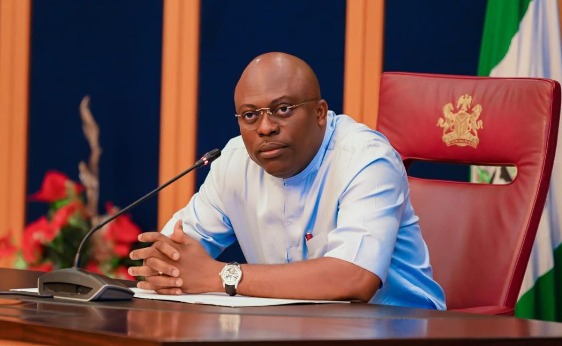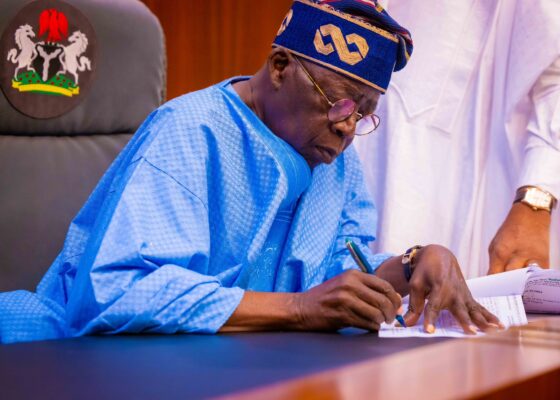
President Bola Ahmed Tinubu Ends the six-month state of emergency in Rivers State
- Nigeria News
- 18.09.2025
- No Comment
- 132
Tinubu Ends State of Emergency in Rivers State
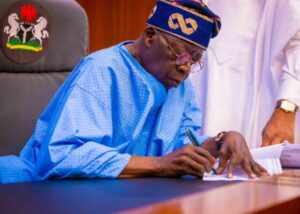
In a significant development, President Bola Ahmed Tinubu has officially declared the end of the six-month state of emergency in Rivers State.
This decision allows Governor Siminalayi Fubara, his deputy Ngozi Nma Odu, and members of the State House of Assembly to return to office starting
Thursday, September 18, 2025.
Related News: Sowore Sues DSS, Meta, and X Corp Over Attempt to Delete Anti-Tinubu Post Corp
DSS Demands Deactivation of Sowore’s X Account Over Tinubu Comment
Tinubu Approves Lifetime Salary for Retiring Senior Officers – Interior Minister
The state of emergency in Rivers State was first proclaimed on March 18, 2025 by President Tinubu.
According to the Presidency, this drastic measure was necessary to address the “total paralysis of governance” that had gripped the state due to political unrest.
The conflict between Governor Fubara and 27 lawmakers loyal to Speaker Martins Amaewhule left the state without a functioning government.
Even the Supreme Court affirmed in one of its rulings that “there was no government in Rivers State,” underscoring the gravity of the crisis.
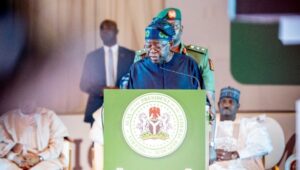
In a statement released on Wednesday, President Tinubu declared:
“It gives me great pleasure to declare that the emergency in Rivers State of Nigeria shall end with effect from midnight today.
The Governor, His Excellency Siminalayi Fubara, the Deputy Governor, Her Excellency Ngozi Nma Odu, and members of the Rivers State House of Assembly
and the Speaker, Martins Amaewhule, will resume work in their offices from 18 September 2025.”
President Bola Ahmed Tinubu explained that invoking Section 305 of the 1999 Constitution (as amended) to proclaim the emergency was inevitable
to prevent a drift towards anarchy. He said the suspension of the Governor, Deputy Governor, and elected members of the State House of Assembly
was initially for six months, which expired on September 17, 2025.
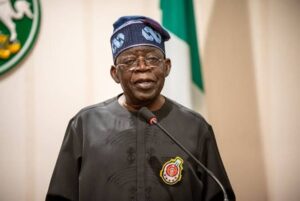
President Bola Ahmed Tinubu noted that the intervention was backed by the National Assembly and aimed at restoring peace and order in Rivers State.
Despite more than 40 lawsuits filed to challenge the declaration, Tinubu maintained that the step was constitutionally justified.
“It would have been a colossal failure on my part as President not to have made that proclamation,” he emphasized.
Tinubu expressed satisfaction with what he described as a “groundswell of a new spirit of understanding” among political stakeholders in Rivers State.
This, according to him, justifies ending the emergency at the expiration of its initial six-month period.
“I am happy today that, from the intelligence available to me, there is a groundswell of a new spirit of understanding,
a robust readiness, and potent enthusiasm on the part of all the stakeholders in Rivers State for an immediate return to democratic governance,” Tinubu said.
He added that the development was “a welcome one” and “a remarkable achievement,” hence there was no reason for the state of emergency
to continue beyond the initially proclaimed period.

Using the occasion, President Tinubu urged governors and state assemblies across Nigeria to prioritize
harmony between the executive and legislative arms of government to ensure that Nigerians enjoy the dividends of democracy.
During the state of emergency, Vice Admiral Ibok-Ete Ekwe Ibas (retd.) served as the Sole Administrator of Rivers State.
His tenure oversaw the management of the state’s affairs until the restoration of democratic governance.
The end of the six-month state of emergency in Rivers State marks a new chapter in the state’s governance.
With Governor Siminalayi Fubara, Deputy Governor Ngozi Nma Odu, and the State House of Assembly
members returning to office, hopes are high for stability, unity, and the restoration of democratic processes.
President Tinubu’s move signals not only the resolution of a constitutional crisis but also a call for greater cooperation between
political stakeholders to avoid similar occurrences in the future.
State of Emergency in Nigeria – Frequently Asked Questions
Why did Tinubu declare State of Emergency in Rivers State?
On 18 March 2025, President Bola Tinubu declared a State of Emergency in Rivers State under Section 305 of the 1999 Constitution, suspending Governor Siminalayi Fubara, his Deputy, and all members of the Rivers State House of Assembly for six months. This was due to prolonged political crisis, legislative paralysis, worsening security (pipeline vandalism), and failure to act on intelligence of threats to critical oil infrastructure.
List of States of Emergency in Nigeria
- Plateau State – 2004 (Ethno-religious violence).
- Ekiti State – 2006 (Political leadership crisis).
- Adamawa, Borno & Yobe States – 2013 (Boko Haram insurgency).
- Rivers State – 2025 (Political impasse, security threats).
Did Tinubu suspend Governor Fubara?
Yes. Under the March 2025 State of Emergency proclamation, President Tinubu suspended Governor Siminalayi Fubara, his Deputy, and the Rivers House of Assembly for six months, appointing a federal administrator to oversee the state during the emergency period.
Meaning of State of Emergency
A State of Emergency is a constitutional provision (Section 305) that allows the President to take extraordinary measures to restore public order, safety, and governance in a state or the entire federation when normal government cannot function properly.
Breaking news in Rivers State today
The State of Emergency remains in effect in Rivers State, with a federal administrator managing state affairs. Political leaders are negotiating resolutions while security operations continue to protect oil installations.
5 Conditions for Declaration of State of Emergency
- War or imminent war.
- Imminent danger of invasion.
- Actual breakdown of public order and safety.
- Clear and present danger of such breakdown.
- Occurrence or imminent danger of disaster or public danger threatening the Federation.
State of Emergency in Nigeria Constitution
Section 305 of the Constitution of the Federal Republic of Nigeria (1999, as amended) empowers the President to declare a State of Emergency and outlines the procedure for National Assembly approval.
History of State of Emergency in Nigeria
Nigeria has had multiple states of emergency, including Plateau (2004), Ekiti (2006), Adamawa/Borno/Yobe (2013), and Rivers (2025). Each was declared due to severe security or political crises.

